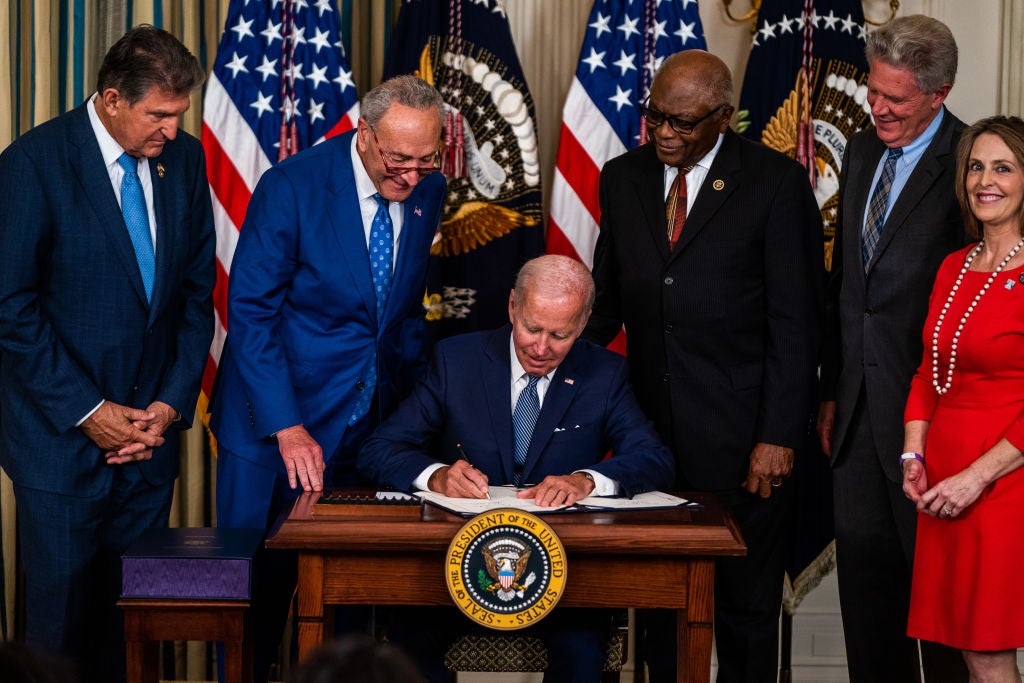
The US’s new inflation-busting bill, with $369bn for clean energy, is the largest US investment in climate ever. It is also, according to our research, the largest national climate investment in history anywhere. Let that sink in for a moment.
This funding will certainly speed renewable energy deployment and green job creation in the US. However, the bill’s investments are so large that they are likely to influence global prices too, and impact the energy transition in other countries in real, tangible ways.

Discover B2B Marketing That Performs
Combine business intelligence and editorial excellence to reach engaged professionals across 36 leading media platforms.
The $128bn investment in clean electricity tax incentives is 13% the size of the entire global renewable energy market. A short-term increase in demand might raise the scarcity and costs of input materials. In the long term, however, increased demand will accelerate technological learning. Researchers have shown that the more renewable energy we install, the cheaper it gets.
How do we know that? Because history tells us.
In the wake of the 2008 global financial crisis, government programmes from the US and Europe were successful in stimulating new demand, to similar effect, and today, clean energy is cheaper than coal or even gas-powered plants. Declining technology costs have in turn contributed to increased adoption in renewable energy, supporting the higher levels of wind and solar we now enjoy.
In other words, we have seen time and again that making investments in clean energy, transport and other sectors leads to new clean innovations and cost improvements for all, directly benefitting and speeding up the energy transition globally. This infusion of research funds is of particular importance for emerging technologies such as green hydrogen and green steel to become economically competitive with traditional alternatives.

US Tariffs are shifting - will you react or anticipate?
Don’t let policy changes catch you off guard. Stay proactive with real-time data and expert analysis.
By GlobalDataWhether we like it or not, US actions at home spur actions abroad. President Ronald Reagan famously repeated “the eyes of all people are upon us”, likening the US to the biblical shining city upon a hill. Independent nations don’t always think independently. For a global problem like climate change, nations shape their own actions on the actions of each other. As the largest historical emitter, and the self-proclaimed “leader of the free world”, US actions are particularly influential.
So, there is also a global policy learning aspect to this, a “leadership effect” where US moves indirectly encourage similar moves globally, and learnings from this economy-wide action could help guide other countries’ similar efforts, both those ongoing and yet to come.
The global workforce does not have the green skill sets to meet the needs of a clean energy transition that would limit warming to 1.5 or 2°C. However, with the new US bill set to create nine million jobs in the next decade, the world could learn from and be inspired by US green skills development and how these sectors expand to include and train workers that will increasingly be needed in the future.
The full impacts of the bill will depend very much on the policy specifics, which remain to be seen. To this end, the US administration has everything to lose. Ineffective policy design and implementation could curtail its climate impacts and harm vulnerable communities.
This is where the US could learn from the world – a project from Oxford University showcases more than 850 green investments from 47 governments in response to Covid-19. Related research shows these investments are likely to create more jobs and achieve higher economic returns than traditional alternatives. Green investments have so much additional value in part because they tend to support new industries with high indirect and induced benefits across sectors.
It also matters how this momentum is utilised by the US international climate team led by Special Envoy for Climate John Kerry. There is space to increase trust and motivation among global partners. The major climate investment will boost US credibility on the world stage, providing a strong new opening from which to share lessons learned and encourage partner nations, especially advanced economies, to accelerate their own climate-friendly policies. Given the risk of the bill’s new allowances for oil and gas leases and the opening of federal lands, this will be a tightrope walk – it would be disingenuous to ask an African nation to stop taking fuel out of the ground, for instance, while encouraging the opposite at home.
[Keep up with Energy Monitor: Subscribe to our weekly newsletter]
Holes persist in US climate policy, that is for sure. For one, a decade-long promise to help developing nations make a climate transition stands largely unfilled. Developing countries have largely delivered their end of the bargain so far, but the US is far behind on delivering its fair share. The risks are existential – if developing nations approach the same emissions footprint per capita as developed nations, all hopes for a tenable climate future would be quickly dismissed. As the US bill prioritises environmental justice at home, US global action on climate should also look out for vulnerable communities abroad.
So, as the world rightly celebrates the many benefits, direct and indirect, that will come from this historic investment, the US would do well to keep its eye on the prize. A win of this magnitude can be a powerful force for unlocking action in other countries. Ultimately, however, the US must lean more into the green than the dirty elements of this bill and follow through on the many other ways it can support an energy transition both at home and within countries most harmed by climate impacts.



